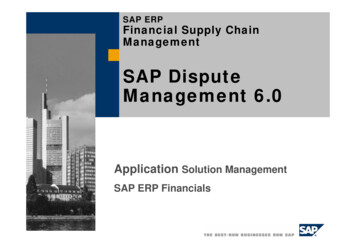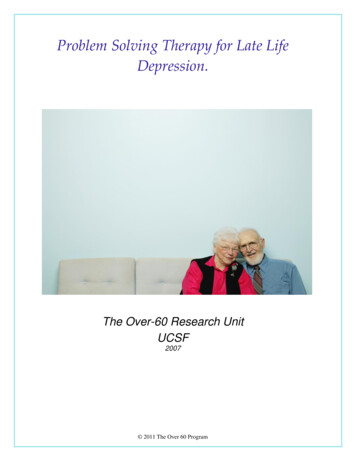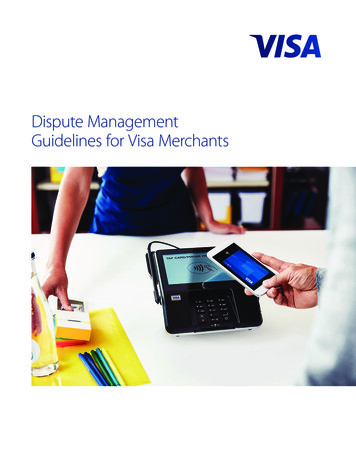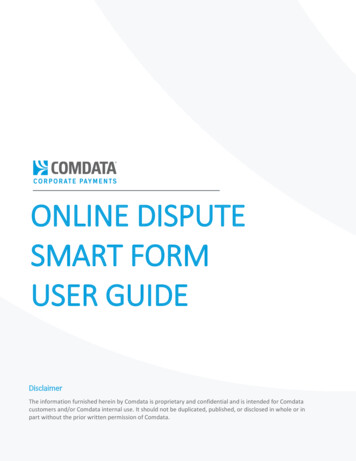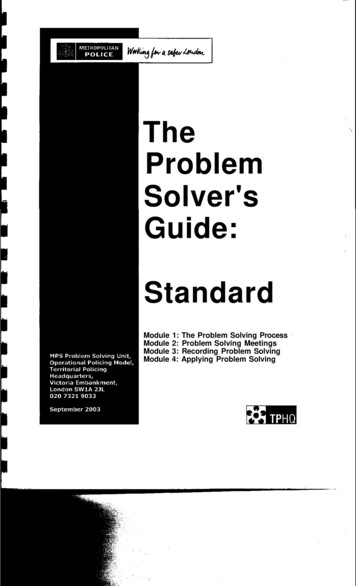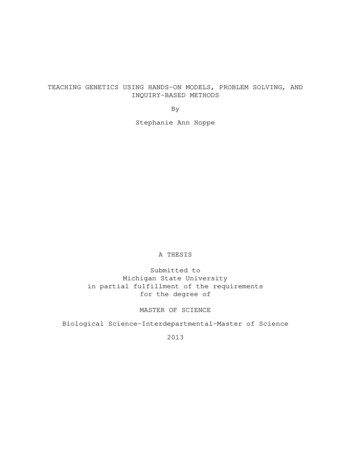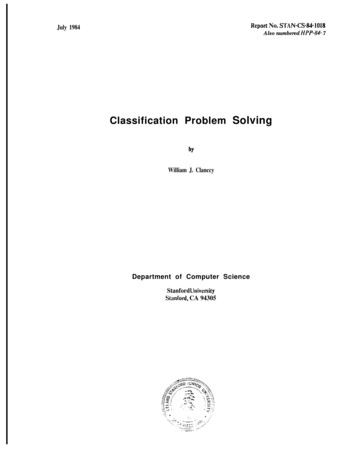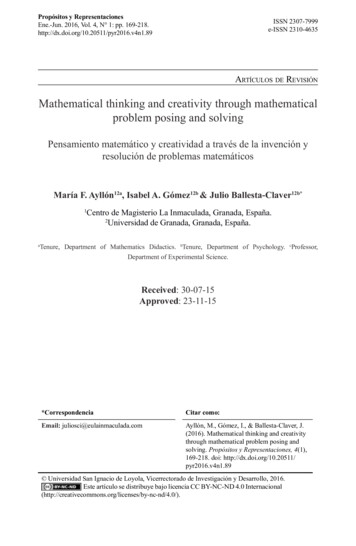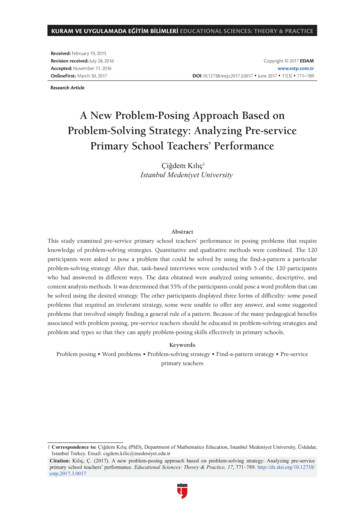
Transcription
PROBLEM SOLVING PROCEDURES, INFORMAL DISPUTE RESOLUTIONGUIDELINES, AND PROCEDURES FOR PROCESSING STUDENTCOMPLAINTS OR GRIEVANCESIntroductionAlliant International University is committed to maintaining a University environment in which its members canlive and work in an atmosphere of acceptance, civility, and mutual respect for the rights, duties, and sensibilitiesof each individual. Occasionally, however, complaints or concerns arise, the timely resolution of which isimportant to maintaining the desired University atmosphere. The University will treat each complaint or concernseriously, and attempts to resolve issues quickly and effectively using informal processes. Alliant encourages theprompt reporting of complaints so that a rapid response can be made and appropriate action taken.Students should use the guidelines and policies that follow if problems arise with Alliant staff, student supportservices, administrators, faculty, or other students.The principles that underlie this policy and its related procedures are that: all students should receive fair and equitable treatment; relationships among members of the campus community will be conducted with respect,professionalism and honesty; most problems can be resolved informally; Mistakes or omissions occur on occasion and need to be corrected. Often problems can be resolvedquickly by identifying them to the appropriate person for correction or resolution; students should take appropriate action as soon as they have a concern that is not being dealt withthrough the normal channels set up to address the area(s) of concern; confidentiality will guide the grievance process to the extent practical and appropriate under thecircumstances; these guidelines and the University’s values obligate everyone to proceed in candor and good faith at alltimes; no students will be penalized for good faith efforts to resolve problems or concerns by using theseguidelines and policies; and Alliant prohibits all forms of harassment and/or discrimination on the basis of race, ethnicity, national origin,medical condition, veteran status, marital status, associational preference, religion, gender, gender identity,sexual orientation, social class, economic status, education, occupation, age, ability, and size.Grievances or complaints that are based on one of these areas need to be reported to the Chief HumanResources Officer at humanresources@alliant.edu or may also be reported to your Program Director orDean.These guidelines and policies are not intended to replace administrative judgment or academic freedom, butinstead serve to facilitate the decision-making process in areas of concern or complaint. (Additionally, there areformal policies and procedures for certain issues such as appeals about grades -- see Alliant’s catalogue -- thatare governed by specific processes that should be followed).43
Informal Actions to Achieve Problem ResolutionThe following steps represent the University’s informal dispute resolution process and, as such, outside legal orother counsel may not be present for either the respondent or the complainant. If outside legal counselbecomes involved, the informal problem solving process ceases. Step One: Students should first attempt to solve the problem through direct discussion.The University encourages discussion between the parties directly involved in a dispute,especially in the early stages. When first faced with a concern or problem regarding academic oradministrative policy, procedure, decision, or conduct, students should first make a good faithattempt to resolve the problem through one or more discussions about the problem with theperson(s) most directly involved. Step Two: If discussion does not solve the problem, help should be sought.If direct discussion does not solve the problem, or if the student would like additional help orsupport in continuing the resolution process, or needs advice about how to engage in adiscussion about difficult issues, or just feels unsure about what next step to take, the CampusDirector (CD) on the student’s campus should be consulted.The CD or designee on campus will assist students with this process. She/he will work to understand theproblem and then will do one or more of the following: Provide consultation about next steps. Provide direct assistance if the problem is administrative. Refer the student to an appropriate academic advisor or administrator, or work with the student toget access to appropriate academic assistance or consultation if the issue is academically related. If multiple issues are involved, the CD can work to assemble all the appropriate parties to addressthe issue. If discrimination or harassment is involved, the CD can assist with any safety issues, and ensure thatthe problem is reported appropriately.The CD is responsible for working collaboratively with students to identify the appropriate University resources tohelp them, and in administrative areas may be able provide direct support. The chart below shows the variouspeople who can provide help and support:44
Individuals Who May HelpCampus Director1Academic Advisor,Faculty Member,Program Director or DeanChief HumanResources OfficerVice President ofStudent ServicesAreas of Responsibility-Communications withstaff-Basic service issues-Environmental issues,which may includequestions about diversityand inclusion-Respectful treatmentamong communitymembers-Financial Aid-Registration-Student Business Office-Tuition and billing-Facilities needs-Academic performance-Discrimination2-Academic progress-Harassment3-Evaluation issues(excluding grades)-Bias-Related Incident4-Unethical behavior-Fear of oficiency reviews-A supervisor, if thestudent is working forthe University-Employmentconditions, if thestudent is working forthe University- Problem solving,including problems thataren’t getting solved- Communicationregarding problems- Finding answers tocomplex or difficultquestions- Facilitating difficultconversations-Classroom statements ofprejudice-Field placement/internships-Issues of culture,diversity, and inclusion1-SafetysecurityIf the andpersonwith whom the student is having difficulty is the Campus Director, student mayalternatively contact the Vice President of Student Services.2Issues regarding discrimination can also be reported to the Office of Civil Rights of the U.S. Departmentof Education, or the California Department of Fair Employment and Housing.3Harassment complaints can also be made to a Program Director or Dean.4Refer to Bias-related Incident Policy and submit Bias Related Incident form.The CD or others being worked with may request that information be provided in writing to assist with theresolution of the issue. A good faith effort should be made to resolve the issues at an informal level beforefiling a formal grievance.45
Formal Complaint Mechanism: Filing a GrievanceStudents have the right to file a grievance, either initially or preferably after first having attempted to resolvethe problem after using the steps and the various resources described above. All grievances must be filedwithin 180 calendar days of the alleged violation or the time at which the person making the complaint (thecomplainant) knew (or should have known) of the alleged violation. Failure to file a formal grievance within the180-calendar-day period constitutes waiver of the right to file a grievance.The student should discuss the grievance with the Campus Director. She/he will assist the student indetermining whether the matter is grievable, and if so, in determining the appropriate grievance officer toaddress the matter. Grievable issues include: Unfair or unreasonable treatment by a staff or faculty member in relation to the discharge of Universityrelated duties; Violation of a duly adopted University policy as described in the University’s catalog, student handbooks,or other publications; Bias-related incidents and/or discrimination under federal, state or local law; or Unethical conduct according to recognized professional standards.The following issues are not reviewable through the grievance process: An issue that would dispute the legitimate exercise of professional judgment by University faculty,administration or staff; The content of any policy or procedure currently in force at the University1; A student performance evaluation or grade for a course or field placement or for independent academicwork under the supervision of a faculty member (grade appeals process applies); A decision regarding a student’s academic status made by a duly designated administrative officer orcommittee; A procedural or final decision of a previous complaint or grievance; or Any action taken more than 180 calendar days prior to a complaint or grievance.The Campus Director will generally seek assistance from other University personnel in making a determinationthat the issue is grievable, and will normally inform the student of that decision within 10 business days exceptwhen the University is closed (e.g., for official holidays). If the grievance is against a faculty member, the CDwill refer the complaint to the relevant academic dean or academic administrator.If the problem is not permitted to be reviewed through the grievance procedure or other University policies thatmay apply, and, depending on the specific issue involved, the Campus Director will either review the complainthim- or herself, based on the specific area of responsibility and authority within which the complaint falls, orrefer the complaint to the appropriate authority, generally, the student’s Program Director, or Dean (if the issueis an academic one, in which case the Faculty Handbook procedures will apply) or to the Chief Human ResourcesOfficer when the issues concerns issues of employment, bias-related incident, discrimination or harassment. TheCampus Director will notify the student in writing of that referral. The University official designated to review thecomplaint will normally issue a ruling regarding the complaint within 20 business days and will provide thestudent, in writing, of the ruling. If more time is needed, the person handling the complaint will notify thestudent to that effect.If the issue concerns a policy that is allegedly unfair, the complaint should be raised through the problemsolving processes described here.1
The ruling on a complaint that is not reviewable in the grievance process is final and cannot further beappealed.If the complaint concerns the Campus Director, the complaint should be filed with the Vice President of StudentServices who will serve as the reviewing or referral authority.After determining that the grievance concerns a grievable issue, the Campus Director will ensure that theGrievance is forwarded to the appropriate University officer who will then become the Grievance Officer, that is,the person responsible for reviewing and deciding the outcome of the grievance. In general, Grievance Officerswill be assigned by the type of concern that has been raised:Grievance OfficerCampus DirectorArea ofGrievance:Administrative mattersProgram Director,Associate or AssistantDean, Dean, or OtherDesignated AcademicOfficial or VicePresident of StudentServicesAcademic mattersChief HumanResources OfficerBias-relatedincidents,discrimination orharassmentIf the complaint concerns one of the designated Grievance Officers, it will be forwarded to the person’ssupervisor, who then becomes the Grievance Officer for the case. Complaints regarding violation ofprofessional ethical standards will be referred to the relevant committee on ethics.When a valid grievance is in process, any related action will normally be stayed until the grievance procedure iscompleted. However, when, in the opinion of the Grievance Officer, there is reasonable cause to believe thatimmediate action is needed for the health, safety, or welfare of the complainant or other members of thecommunity or to avoid disruption of the academic process, the Grievance Officer will work with appropriateparties to take immediate interim appropriate actions. All parties will be informed in a timely manner and inwriting of any such interim actions.Roles and Responsibilities of the Grievance Officer Records the date of the grievance as the date the complaint was determined to be reviewable as agrievance. Provides the person against whom the grievance has been filed (“the respondent”) with a copy of thegrievance and a copy of the grievance processing procedures. Provides a copy of the grievance procedure to the complainant and assists the complainant withinformation regarding the complainant’s right and responsibilities in the process of filing a grievance. Provides copies of the grievance to appropriate University personnel in a confidential manner for recordkeeping purposes only. When the person against whom the grievance is filed is another student, a copy47
of the complaint is filed with the Vice President of Student Services. When the respondent is a staffmember, a copy of the complaint is filed with the Human Resources Office. Appoints a three-person panel to hear the grievance. The panel shall consist of one student, onefaculty member, and one non-faculty employee, all chosen at the discretion of the Grievance Officer.All panel members must be full-time in their respective roles, and must have worked or been a studentat the University for at least one full year. A hearing panel member must withdraw from participation ifa conflict of interest is (or should be) anticipated. Makes requests for all documents relevant to the complaint, and ensures (subject only to privacy laws)that all information is distributed to all parties. Documents not deemed relevant to the complaint by theGrievance Officer will not be forwarded to the grievance panel or the parties. Establishes a date (that can be no later than 30 calendar days after the grievance was determined to bereviewable as a grievance) for the grievance hearing panel to meet. All parties will be given reasonableadvance written notice of the hearing. This notice of the grievance hearing will include a brief statementof the factual basis of the complaint, the time and place of the hearing, and the names of the panelmembers. Either party to the complaint may request a new panel member on the grounds of conflict ofinterest but must submit the request directly to the Grievance Officer prior to the hearing date so that analternate panel member can be identified. Requests for new panel members that in the exclusivejudgment of the Hearing Officer do not have an appropriate basis will not be approved.Rules for Investigating the Complaint Retaliation, harassment, or discrimination against a student filing a grievance or participating as awitness in the investigation will not be tolerated. Any incidents of retaliation should be reportedimmediately to the Grievance Officer or the Vice President of Student Services. Allegations ofalleged discrimination or harassment should be reported to the Chief Human Resources Officer. Only those who have an immediate need to know, including the individual to whom the report is made,the accused, and any witnesses or other involved parties, are permitted to know the identity of thecomplainant. Persons contacted in the course of the investigation will be advised that all partiesinvolved in a charge are entitled to respect and that any retaliation against an individual who has madea complaint, or who has provided evidence in connection with a complaint is a separate actionableoffense as provided below. Confidentiality is to be maintained throughout the investigation to the extentpractical and appropriate under the circumstances. If any party fails to cooperate with a University-sponsored investigation, he or she will be subject toappropriate discipline. If the investigation results in a finding that the complaint falsely, knowingly or in a malicious manneraccused another of violating University policies, the complainant will be subject to appropriatesanctions, up to and including dismissal from the University. Both parties shall receive copies of all documents developed or utilized in the investigation of thecomplaint (in so far as is consistent with privacy laws). The University will maintain a confidential written record of the grievance and how it was investigatedand resolved in the appropriate office (CD, VP of Student Services, or Human Resources). This recordwill be retained for six years from the date of resolution of the grievance unless new circumstancesdictate that the file should be kept for a longer period.Roles and Responsibilities of the Hearing Panel Has the discretion to establish reasonable procedures for the hearing.48
Discusses testimony, hears issues, and considers all available evidence pertaining to the charge(s). Anyrelevant evidence may be admitted if it is the sort of evidence on which reasonable and responsiblepersons are accustomed to relying in the conduct of serious affairs. This is true regardless of theexistence of any common law or statutory rules that might otherwise make improper the admission ofthe evidence. Judges the relevancy and weight of testimony and evidence and makes its finding of fact, limiting itsinvestigations and decisions to the formal charge(s). Accusations not specifically related to the allegedviolation will not be considered. Conducts the hearing in a fair, dignified, and orderly manner. Makes an adequate record of the proceedings using tape recording or other appropriate means since allevidence becomes part of the overall record of the grievance. Renders a decision no later than ten (10) University working days after the hearing is completed andnotifies the Grievance Officer in writing.Hearing Rules Grievance hearings are closed except for the parties involved and their advisors, and any relevantwitnesses. Witnesses may be excluded from the hearing except while giving testimony. Any member of the panel may ask questions. The panel may call other “expert” witnesses for assistance, whether or not the parties presenttestimony from experts at the hearing. Anyone who disrupts the hearing may be excluded. Representation by outside legal counsel is not permitted. However, each party may choose a non-legaladvisor from the Alliant community (current Alliant student, faculty, or staff) to assist in thepresentation of evidence. Advisors are not permitted to participate directly at the hearing. Consultationat the hearing may occur only with the consent of the hearing panel.Outcome and Notification Within 15 working days of the grievance hearing, and subject to any legal restrictions on the disclosureof disciplinary actions and appeal rights, the Grievance Officer will notify in writing the parties involvedin the grievance of the findings of the hearing panel. Any University staff or administrator found to be responsible for offenses in violation of University policywill be subject to appropriate disciplinary action up to and including dismissal. The severity of thedisciplinary action will depend on the circumstances of the infraction. Any student found to be responsible for offenses in violation of University policy will be subject toappropriate disciplinary action up to and including suspension or dismissal. The severity of thedisciplinary action will depend on the circumstances of the infraction. The notification will include information about the right to appeal the decision.49
Appeal Issues The findings of a grievance hearing panel may be appealed only on the following three grounds.1. Errors in interpretation or implementation of grievance procedures were so significant as toeffectively make a fair hearing of the issues impossible;2. Presentation of new and significant evidence that could not have been discovered by diligentpreparation for presentation at the initial hearing is now available; or3. Lack of substantial evidence in the record to support the outcome. Appeals concerning administrative matters are made to the Vice President of Student Services. Appealsconcerning academic matters other than those involving faculty members (in which case the FacultyHandbook provisions apply) are made to the relevant school/college Dean or to the Provost/VPAA.These individuals may designate someone other than themselves to serve as the Appeal Officer becauseof a conflict or other constraints. The identified person becomes the Appeal Officer. The request for appeal must be made within 10 working days of the original decision. The Appeal Officer will determine whether the grounds for appeal have been met. If not, thecomplainant will be so informed and no appeal process will take place. If the Appeal Officer determines that the grounds for appeal have been satisfied, s/he will conduct athorough review of the evidence, and issue a written decision to the parties within 10 working days ofthe receipt of the appeal. The decision of the appeal officer is final except when the Appeal Officer’sbehavior in the appeal is itself at issue, in which case the University’s President is the reviewer and finalappeal authority.***Questions about this policy should be directed to the Campus Director.Revised 10/22/1350
seriously, and attempts to resolve issues quickly and effectively using informal processes. Alliant encourages the prompt reporting of complaints so that a rapid response can be made and appropriate action taken. Students should use the guidelines and policies that follow if problems arise with Alliant staff, student support
